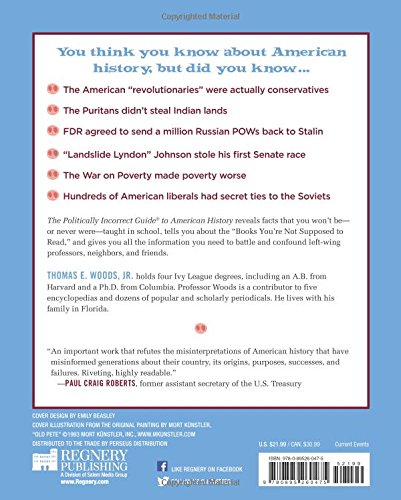Customer Services
Copyright © 2025 Desertcart Holdings Limited




The Politically Incorrect Guide to American History
B**C
Our Unmasterable Past.
It is somewhat ironic that Dr. Thomas Woods recently released How the Catholic Church Built Western Civilization, as its celebration of Christianity may well make it as unpopular among the intelligentsia as is The Politically Incorrect Guide to American History. The latter is a directed tour of our nation's forbidden history, and the title alone guarantees that it will never be found in any liberal arts syllabi. I finished reading it yesterday and am somewhat surprised to admit just how much it has to offer. In fact, I am now thoroughly bewildered as to the extent in which it was vilified by the mainstream media.Ordinarily, I don't pay a whole lot of attention to the derisive observations of The New York Times, but The Weekly Standard is a journal that I respect, and Max Boot's review was far from favorable. Therefore, I assumed that Dr. Woods may have "gone over the edge" in this narrative, but am happy to report that this book cannot simply be dismissed with the word "polemic." I admit that I do not agree with all of the narrator's arguments and opinions; however, the little known facts, quotations, and accounts added much to my aggregate knowledge of America. For this reason, the book's value cannot be denied.The ideas he shares are rare and necessary. Through both the body of the text and in the inclusion of small boxes and sidebars, the narrator identifies primary sources and allows their voices to refute contemporary assessments on their own. Items like "What Our Founders Said, What a President Said or What Our Allies Said" enable the words of the great men to resonate. Dr. Woods also provides "PC Today" subsections that highlight the moronity of conventional wisdom (sic) regarding American history. Further, the "A Book You're Not Supposed to Read" recommendations are quite serviceable for those of us not immersed in the historiography of America. These little formatting aspects enhance the readability of The Politically Incorrect Guide to American History and heighten its pleasure.Most of these pages are a factual rejoinder to the dogma that proliferates around us. Was Franklin Delano Roosevelt the hero that most of our citizens believe him to be? The admiration that Roosevelt and his administration maintain seems fantastic given the anti-achievements of his economic record. The New Deal merely consolidated and expanded the shadow socialism practiced by Herbert Hoover. Indeed, when one closely evaluates FDR's programs and initiatives, he appears to be no more than an overly muscular, power-obsessed version of the president who preceded him. In short, that Brahmin was no Messiah. The New Deal made a mockery out of helping the poor as it subsidized the slaughtering of pigs and the destruction of grain in the hopes of boosting commodity prices while tens of thousands went to bed hungry as a result. The actions of the federal government made the depression of the 1930s a Great Depression.Perhaps the most politically incorrect fact of all is that Joseph McCarthy was far more correct about the reality of the 1940s and 1950s than are many of the professors who instruct students about the period today. Senator McCarthy was rude, drunk, and self-promoting, but the Venona Documents proved that our government was riddled with communist operatives. This reality has not daunted our liberal aristocracy as they still obsess over the naming of names. In the final analysis, it seems that not nearly enough were mouthed fifty years ago. Venona has definitively proven that Communist Party USA was propped up by the Soviets solely for the purposes of espionage, and it is absurd to now pretend that communist affiliation did not increase the likelihood of one being a traitor.The Politically Incorrect Guide to American History has the type of bountiful yield that would make one of FDR's A.A.A. bureaucrats want to start up a tractor for the purposes of mowing it under. I have no doubt that the reader, much like this reviewer, will discover useful facts and quotations within every chapter. Certainly, with it being only 246 pages, it is not a definitive tome but it definitely is a start. Hopefully more scholars will come forth and reclaim our factual history while forcefully arguing that telling the truth is not merely one form of historical narrative or perspective. It is THE only perspective. We need more Dr. Woods's to battle the Foners and Zinns who corrupt the nation's youth. These charlatans have cut and pasted our historical record into a montage in which only slavery and oppression can be viewed. We must undo their foul editing and let the brilliance of our centuries radiate.
D**E
Excellent, but sparse, and more partisan Republican than ideologically sound
Dr. Thomas Woods had a difficult task in writing the P.I.G. to American History: Distilling U.S. history into 246 pages, and righting every wrong perpetrated by the government-worshipping state-funded education system. Obviously, the book is lacking in some (many areas) -- there's no way it couldn't be, given the P.I.G. format.The book is excellent and everyone should read it. However, other reviewers have rightfully sung Dr. Woods's praises, and most of the criticism has come from the vitriolic and intellectually deficient Left, here; so let me critique the book from the small-government side.Although the book exposes Abraham Lincoln for the tyrant he was, it is strangely silent on the father of imperialism, William McKinley, or his even more boisterous step-son, Theodore Roosevelt. Regardless of the abbreviated page count, nary a mention of the despot T.R. -- after whom many modern "conservatives" model themselves -- is inexcusable, and one cannot help but think the GOP-shilling Regnery Press played a role in this. The anti-market Taft is also only mentioned in a positive light, briefly, as a Supreme Court Justice.Woodrow Wilson is then given his just deserts as the worst president in the history of the republic. However, the fact is that T.R. and McKinley set the stage for him. Never a mention of this. Nor a mention of the birth of the Federal Reserve under Wilson. Nor a mention of his legendary racism. Woods could have saved some of the Clinton bashing at the end in order to cover the birth of the Fed.But mostly, it isn't the ommission of criticisms versus Democratic presidents, but the complete silence against the crimes of Republicans that is bothersome. Yes, traditional history texts explore Watergate and Iran-Contra, etc., but Eisenhower, Nixon, Bush 41, and Reagan needed to be criticized from a Missean/free-market perspective, and they weren't here. No mention of Eisenhower's disasterous Iran coup or the socialist federal highway system. No mention of Nixon's price and wage controls or taking us off the gold standard. While Wilson and FDR are correctly blamed for entering us into pointless wars, and Truman is excoriated for foregoing a congressional declaration and entering the Korean War, nothing is mentioned about similar actions taken by Reagan or Bush 41.Worst of all is Wood's implication that the Vietnam War -- though not the Civil War, nor World Wars I or II -- was a just war that wasn't fought correctly. Why? Because "the Left" was against the war. Communism did spread and who cares? One has to believe Communism works in order to fear it. This was the mistake of post-War conservatism. It was actually Marxian in thought.Hoover is the only Republican identified for his socialist ways. And no Democrats are celebrated. Although his presidencies were uneventful, Grover Cleveland should have been highlighted as the model executive. His omission here is troubling because he is omitted virtually everywhere else, too. Of course, he was a Democrat, so...Again, this book was excellent and everyone should read it. However, like other Regnery Books written by libertarians, there are too many giveaways to the conservative audience. Yes, fascist neocons will still be shocked by this book, but I'm sorry Woods had to pull any punches.
P**S
Not perfect, but an interesting view of American history.
I recently lost my copy of this book, so I have just bought another, this time from Amazon - the fact that I would buy another copy indicates that I think it is a book worth having. It is not a perfect history - and I certainly do not agree with everything in it (for example I think that Dr Woods underestimates the importance of slavery in the Civil War, and he almost ignores the world wide plans of Imperial Germany in the First World War), but it is a work that is worth reading and thinking about. At least Amazon U.K. does not push the absurdly biased "Publisher's Weekly" review that Amazon in the United States does. "Publisher's Weekly" always hates conservative books, so their reviews are worthless.
C**N
Very insightful and revealing
Fantasic book by a clearly talented author. Woods delivers his message with style and humour and backs it up with a great deal of knowledge. The facts laid down here certainly fly in the face of much of the default narrative.
E**C
I am shocked at how enlightening this book is
I thought I knew the topics that would be discussed in this book. Imagine my surprise when I found that most of what I thought I knew was either lies or misleading information. And then there was so much more to know tooWhen you're done you see an entirely different picture. And for that, the author deserves all the praise for this excellent piece of literature
P**N
A Different Interpretation Of US History
Woods goal is to counter the common themes taught in the US school system, regarding American history. Personally, I did not really pick up any new information. I was already familiar with the political situation, that led to the US Civil War. I was also well acquainted with FDR`s New Deal, and the real results of those programs. There were also some areas of disagreement. Yes FDR did try to help the British, before the US entered the war. Woods was outraged with FDR`s under handed politics. I on the hand, believe FDR`s anti German policy was a noble pursuit.Over all this was a fun read. Most of the main points I agreed with. This book is a very compressed version of American history. Woods also lists lots of suggested readings, for anyone looking for further expansion into a particular topic.
C**B
PIG to American History
The Politically Incorrect Guide to American History is a well written book and is nicely presented, but it has some flaws. While it is impossible to cover every aspect of American History in a short volume (and the author does not intend to do so), in my view the focus of the book is overly narrow, as most of it is on political and economic history and consists of the author giving his views on certain federal laws, court decisions or presidential actions based on the conservative principles of limited federal government and free market economics. In particular, there are omissions of some important topics in American history, such as the relationship of settlers of the West with American Indians (with only minimal coverage of the relationship between the the Puritans and Indians), which is a key aspect of American history that is full of myths, fictions, misunderstandings and falsehoods. In addition, in order to make his points, the author frequently takes a one-sided and simplistic position on a topic to an extent that his method is no better than the PC approach that he is taking issue with. Despite its shortcomings, this book is a light read and does a service in challenging a number of significant myths that exist in American history, many of which have been created and perpetuated in the name of political correctness.
Trustpilot
2 weeks ago
2 months ago